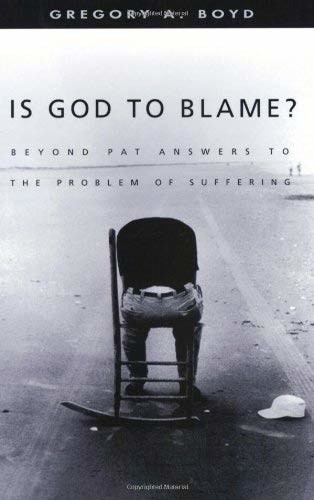Is God to Blame? Moving Beyond Pat Answers to the Problem of Suffering
 Author: Gregory A. Boyd
Author: Gregory A. Boyd
Publisher: InterVarsity Press (2003)
Topic: Theology/ Apologetics: Is God behind the suffering we experience in life?
Media:
Description: Is God to Blame? This is often the question that comes to mind when we confront real suffering in our own life or in the lives of those we love. Pastor and author Gregory Boyd helps us deal with this question honestly and biblically while avoiding glib answers. Writing for ordinary Christians, Boyd wrestles with a variety of answers that have been offered by theologians and pastors in the past. He finds that a fully Christian approach must keep the person and the work of Jesus Christ at the very center of what we say about human suffering and God’s place in it. Yet this is often just what is missing and what makes so much talk about the subject seem inadequate and at times misleading. What comes through is a hopeful picture of a sovereign God who is relentlessly opposed to evil, who knows our sufferings and who can be trusted to bring us through them to a renewed life.
Greg’s story behind the writing of Is God to Blame?: To me, the most forceful objection to belief in an all-good and all-loving God is the problem of evil. Not only this, but in my opinion this is the objection the majority of Christians — including Christian scholars — respond to least effectively. It’s not their fault, however, for they’re strapped with a theology that doesn’t allow them to provide a compelling response to this objection. Most believe that everything that happens is either specifically willed or allowed by God. (I call this “the blueprint worldview” since it assumes that everything in history unfolds according to a divine “blueprint”). This view commits believers into thinking God wanted each and every event to occur — or at least that he wanted it to occur more than he wanted to stop it, otherwise he wouldn’t have allowed it. And this is why they can’t give a cogent response to the problem of evil. What particular reason might God have had for allowing (say) a little girl to be kidnapped, tortured, raped and killed?
Now, I’d already addressed this issue in my book Satan and the Problem of Evil. But, as many people told me, this book was too academic for lay people to follow. Is God to Blame? was thus written to put forth my thoughts in a way that people untrained in philosophy or theology could understand. However, the process of writing the book helped further crystallize my thinking, taking me beyond what I’d written in Satan and the Problem of Evil on certain points.
While many who are committed to the “blueprint worldview” will find my thoughts disturbing, I’ve been blessed to receive thousands of e-mails from people who tell me this book set them free to see, for the first time, God as altogether beautiful — despite the massive evil in the world. Some of these e-mails have been profoundly moving. For example, a mother told me Is God to Blame? empowered her to finally stop blaming God for the drowning of her two year daughter five years earlier. Now, instead of keeping God at bay with her rage, she could let God embrace her, weep with her and finally heal her.
